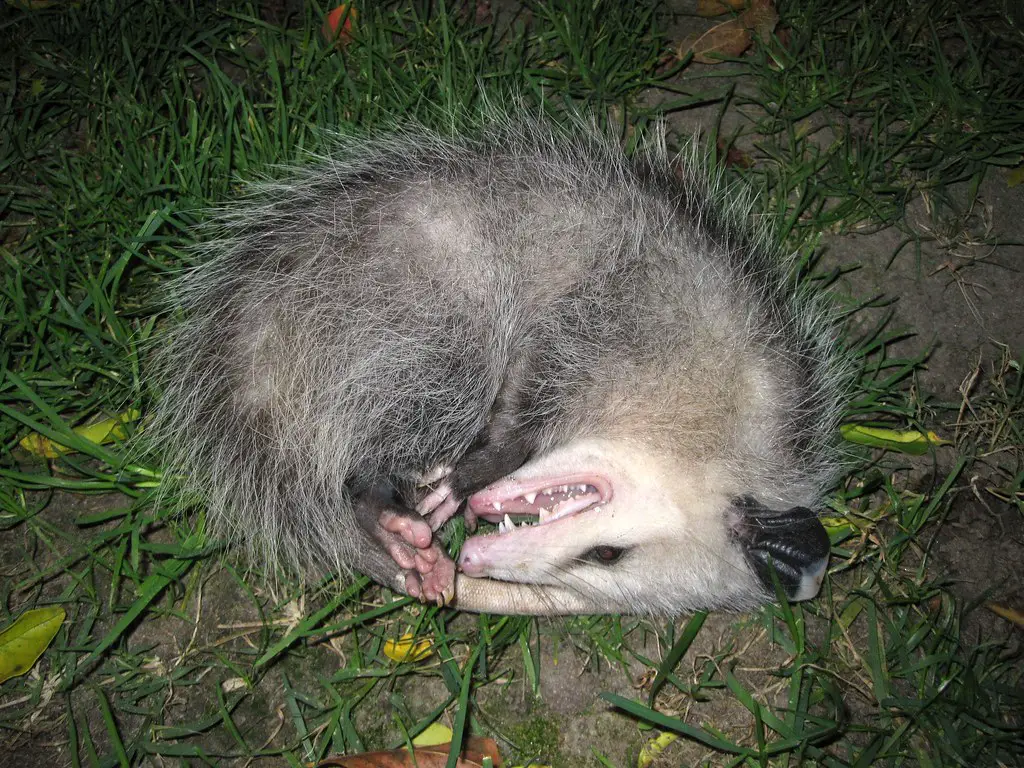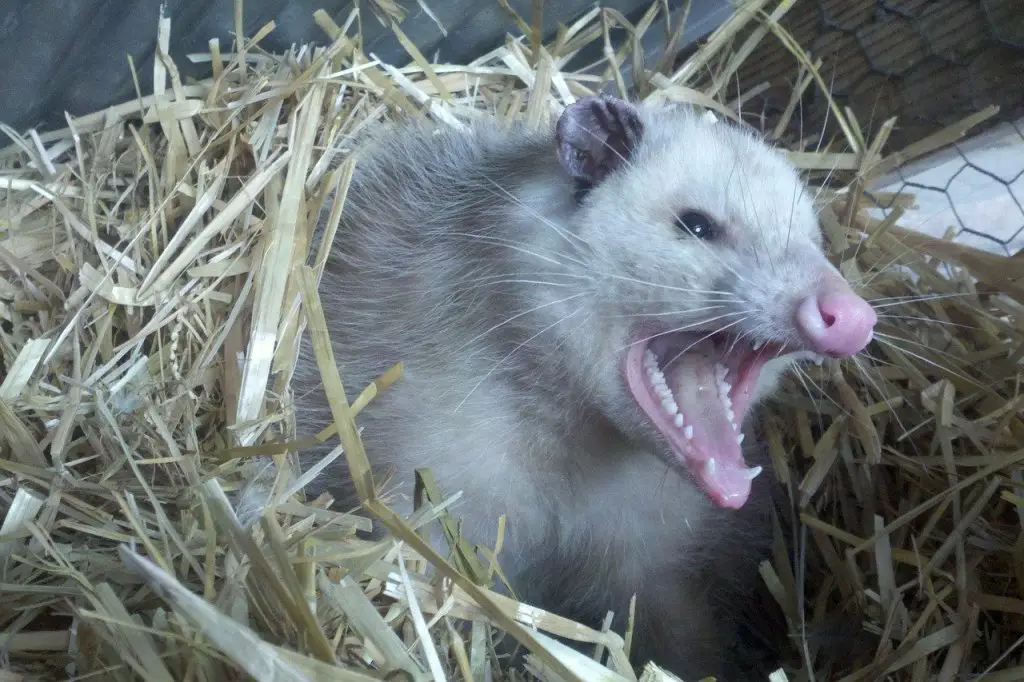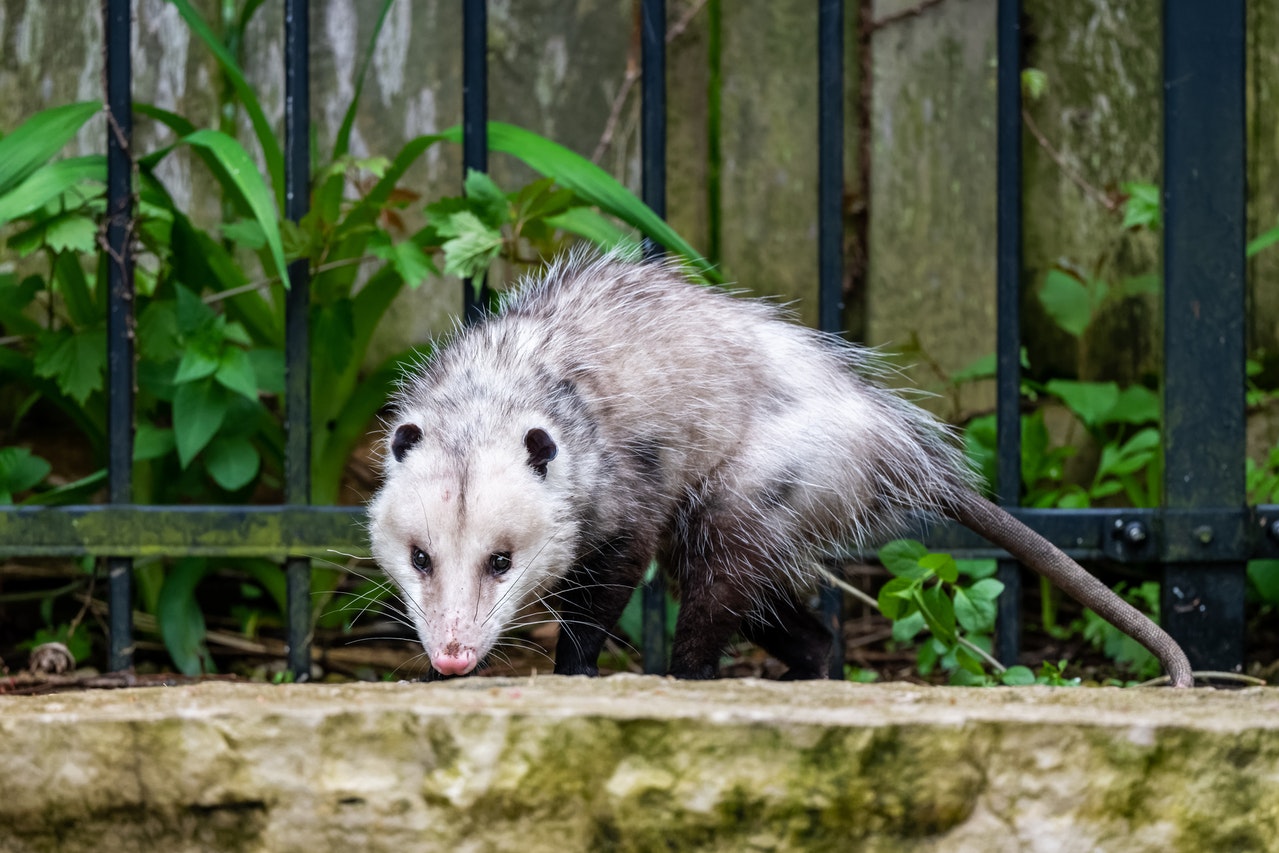Playing dead on the part of this marsupial is a physiological response - It is automatic and involuntary. Because of the anxiety and shock caused by a possible attack, the North American opossum enters a comatose state, lasting from 40 minutes to a maximum of 4 hours.
The Didelphis virginiana or North American opossums are generally peaceful animals who avoid conflict whenever possible. However, if cornered, they have been known to hiss, snarl, or even bite.
Due to their peaceful nature, it is far more likely that an opossum will pass out or “play dead” when confronted with the possibility of a fight.
The opossum’s body goes limp, its front feet curl up into tight balls, its lips pull back, and it begins to drool from the mouth.
In this state, the Virginia opossum does not show any signs of distress when you poke it, turn it over, or even carry it away.
The fact that the North American opossums can imitate not just the look but also the scent of a dead animal is arguably the most remarkable aspect of their sophisticated bluffing routine.
Read on to find out why opossums play dead and how long opossums play dead.
Table of Contents
Why Animals Play Dead
You should know that playing dead is not unique to this critter. Playing dead, often referred to as tonic immobility or Thanatosis, is a sort of adaptive behavior exhibited by various animals like mammals, reptiles, and insects.
Although tonic immobility is more popular in the most preyed species, even vicious predators play dead.
Thanatosis is a strategy frequently employed by animals for the following reasons:
- Ruse to capture live prey
- Strategy for sexual reproduction
- Defense mechanism
Why Do Opossums Pretend to Be Dead?
We’ve established that the opossum will feign death when it’s being attacked or when a prey catches it unawares.
The opossum employs Thanatosis hoping to fool a potential predator into dropping its guard, giving it a better chance of escaping unscathed. In this condition, the opossum can take significant assault without showing any signs of discomfort.
Depending on the dire circumstances, it can remain in the catatonic state for minutes to hours at a time.
As stated earlier, opossums are normally peaceful animals that only occasionally display aggressive behavior.
Due to their size and the fact that they move so slowly compared to other animals, opossums are susceptible to being eaten by other animals. As a result, opossums are prey to various animals, including coyotes, foxes, and dogs.
How Do Opossums Play Dead?
When an opossum is overcome with the overwhelming anxiety of perhaps being hurt by an attacker, the overwhelming terror they are subjected to causes a seizure, and they fall to the ground as if they were dead.
They enter a comatose state which can linger for hours. This state makes the opossum motionless.

They can only stare blankly in front of them, with their tongue hanging out until the condition passes. Also, their body temperature drops by some degrees.
When an opossum reaches the comatose state, it also begins to produce an offensive odor comparable to the stink of a decomposing body.
They aren’t just pretending to be dead. They have an odor that suggests they have been dead for some time.
How Do You Know If an Opossum Is Playing Dead?
Since playing dead is the opossum’s thing, the challenge would be knowing when an opossum is playing dead and when it’s actually dead.
So how do you know an opossum is playing dead?
You want to pay attention to how long the comatose state lasts. It shouldn’t go for more than 4 hours.
Meanwhile, watch out for the following initial signs:
- It becomes immobile, its body takes a prone position and becomes stiff
- The opossum’s mouth is wide open
- It does not respond to your touch or pinching
- Salivation
- Urination
- Defaecation
- Erection (in males)
- Body temperature drops
How Long Will an Opossum Play Dead For?
Usually, an opossum will only last up to 4 hours when feigning death. But it could also take a few minutes.
It depends on the threat it perceives.
Can You Wake Up or Pick up an Opossum Playing Dead?
We’ve learned that playing death opossums is an entirely involuntary reaction due to the intense stress that both adult and baby possums feel when faced with danger. Therefore, you cannot wake them up even with good intentions.
The opossum is considered to be alive if it can breathe. Also, its body temperature should be warm.
Please note that you should not pick the possum up or move it using your unprotected hands. You want to put on gloves before moving it using a shovel while it is playing dead.
Opossums have 50 teeth, which makes for a devastating bite. Nonetheless, an opossum only bites as its last resort.
Also, remember to grab the opossum by its tail if you are using your hands. You can then hold the scruff of its neck to help avoid any biting.
Remember: Opossums Don’t Pretend to Be Dead
When threatened, opossums will not play dead as some other animals will. They do not voluntarily enter the state. They fall into this catatonic state.
When you encounter a marsupial “playing possum,” it is usually because a predator has attacked it.
While in this state, you can poke the possum, but it won’t react. So it would appear that it has died, given all of the evidence.
This defense mechanism is designed to throw off its would-be attacker and allow the opossum to flee.
Even while they have a chance of surviving these kinds of confrontations, they still risk getting hurt.
Researchers have discovered many opossums living in the wild that have fractures and healed wounds, which they believe were caused by attacks. Unfortunately, others are roadkill because this reaction does not exclude roads.
What Are Some Other Ways That Opossums Try to Evade Predators?
Opossums have a few more defense mechanisms in addition to their capacity to play dead, which is one of the most successful ways to avoid being attacked by a wild animal.
An opossum lets off a low growl when it feels intimidated by a lesser predator. That helps in scaring the smaller predator.

This animal with a long prehensile tail might also show its extremely sharp teeth if it feels threatened.
The level of danger that an opossum perceives determines whether it will growl or feign death.
What Other Animals Play Dead?
Opossums have introduced a new facet to scientific inquiry thanks to the one-of-a-kind defense mechanism they employ. Recent studies have shown that this peculiar behavior of feigning death is not exclusive to opossums.
Instead, many different animal species also exhibit this response whenever they perceive danger or when they are attacked.
1. Sharks
Different shark species also play dead. These include the Tiger shark, Reef shark, and Lemon shark. You can induce tonic immobility in these sharks when you lightly place your hand on their snout around the eyes.
Orcas are known to take advantage of the tonic immobility that sharks experience when hunting them.
2. The Hognose Snake
Another fascinating example of animals playing dead may be seen in the Hognose snake, native to America. When this snake detects an undesirable condition, it will roll onto its back, making it look dead.
You then see it emitting a putrid odor and a volatile fluid oozing from its body. This behavior will scare away any potential predators.
3. Goldfish
When they sense danger, some creatures, like the goldfish and cichlids, enter a state known as quiescence, where they become inactive and immobile for some time.
So What Does “Playing Possum” Mean?
Whenever one brings up the question of playing dead, the first thing that comes to mind is an opossum. It is not surprising that playing dead is often called “playing possum”.

